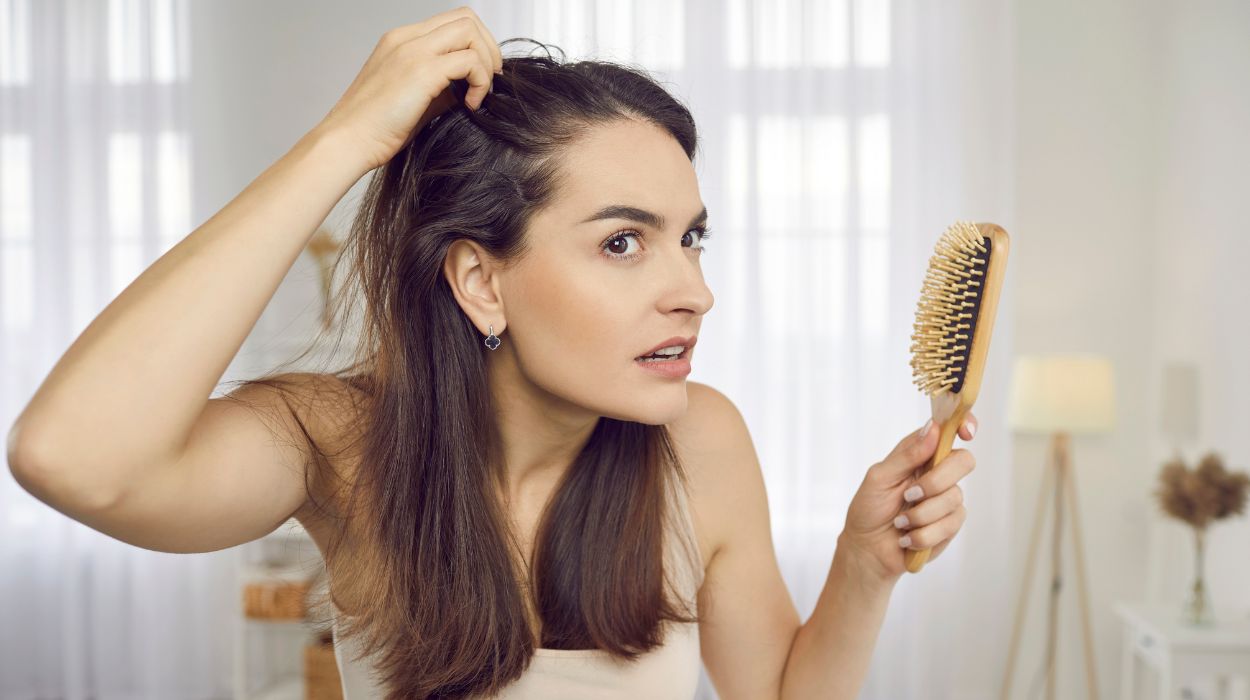 Expert's opinion
Expert's opinion
Expert's opinion
The article is a subjective view on this topic written by writers specializing in medical writing.
It may reflect on a personal journey surrounding struggles with an illness or medical condition, involve product comparisons, diet considerations, or other health-related opinions.
Although the view is entirely that of the writer, it is based on academic experiences and scientific research they have conducted; it is fact-checked by a team of degreed medical experts, and validated by sources attached to the article.
The numbers in parenthesis (1,2,3) will take you to clickable links to related scientific papers.
Does Adderall Cause Hair Loss? Here’s What Experts Say In 2024

If you’re taking Adderall[1] to treat ADHD, you might wonder, “Does Adderall cause hair loss?”
Hair loss is a concern for many. So understanding whether Adderall side effects include hair loss is crucial for anyone taking or about to take Adderall.
This article delves into the possibilities of Adderall-induced hair loss and its connection to the stimulant drug. We’ll explore the essential factors to answer the question, can Adderall cause hair loss? We shall also refer to a few expert tips on how Adderall may negatively impact hair follicles and discuss the role of nutritional deficiencies.
Finally, we’ll touch on hair loss prevention tips and provide insights for maintaining healthy hair growth while managing your mental health disorder.
Does Adderall Make You Lose Hair?
The connection between Adderall and hair loss is still debatable.
While some people have reported experiencing hair loss while using Adderall, it’s not a guaranteed side effect for everyone.
Factors such as your response, dosage, and underlying conditions may contribute. If you’re concerned about hair loss while taking Adderall, it’s best to consult a medical professional who can provide personalized advice. They can evaluate the potential causes and explore alternative treatments or adjustments to manage ADHD symptoms while addressing any hair-related concerns.
Does Adderall Cause Hair Loss In People With ADHD?

The answer to the question “Does Adderall cause hair loss?” is still being debated. Understanding the link between Adderall-related hair loss requires a closer look at the effects of stimulant medications on the body.
What Is Adderall?
Adderall is a central nervous system stimulant commonly prescribed to treat ADHD. This stimulant drug, amphetamine, helps people with ADHD focus and control impulsive behavior.
It contains amphetamine and dextroamphetamine,[2] which increase the levels of certain chemicals in the brain. While it effectively manages ADHD symptoms, concerns loom about its potential side effects, including hair loss. Some people taking Adderall have reported experiencing[3] hair pulling, which may lead to hair loss.
Understanding the link between Adderall-related hair loss requires a closer look at the effects of stimulant medications on the body. However, research is still scarce since Adderall’s impact on hair follicles and the normal hair growth cycle is still in its infancy.
Nutritional deficiencies,[4] high anxiety, stress levels, and even Adderall-induced trichotillomania may contribute to hair loss and greying.[5] However, it’s essential to note that not everyone who takes Adderall will experience hair-related side effects.
The following sections will explore the potential causes of hair loss related to Adderall use.
The Connection Between Adderall And Hair Health
While Adderall can help manage your ADHD symptoms, you may experience some hair-related issues, such as thinning hair or hair loss. The connection becomes clearer when you look at the underlying factors. So, here are some possible links between Adderall and hair health:
Compulsive Hair Pulling And Hair Loss
One possible factor contributing to hair loss from Adderall is compulsive hair-pulling behavior, also known as trichotillomania.[6] Adderall-induced trichotillomania is an impulse control involving recurrent, irresistible urges to pull out your hair. This hair-pulling disorder may result in noticeable hair loss.
Adderall use can potentially exacerbate or trigger[7] this behavior in susceptible individuals, leading to hair follicle damage and hair loss.
Nutritional Deficiencies And Sudden Weight Loss
Another factor that can impact hair health during Adderall use is sudden weight loss and potential dietary deficiencies.
Adderall is known to suppress appetite,[8] which can lead to sudden weight loss and inadequate nutrient intake. Plus, many children with ADHD already have nutritional deficiencies,[9] so adding a suppressed appetite can worsen things.
So, a lot of essential vitamins and minerals necessary for healthy hair growth may be missing. Naturally, this affects blood flow and nutrients available for the hair follicle, leading to thinning hair.
High Anxiety And Stress levels
Although these two aren’t direct causes of hair loss while using Adderral, they might still factor in hair loss. The link might be that using Adderall under immense stress[10] may lead to even further hair loss.
For example, stress disrupts the normal hair growth cycle, increasing shedding and potentially triggering conditions like telogen effluvium — a scalp disorder that leads to hair loss from stress. Adderall can also affect stress and anxiety levels in some individuals, potentially exacerbating[1] hair loss.
Other Side Effects Of Adderall
In addition to the concerns surrounding hair health, there are several other side effects associated with Adderall that you should be mindful of, such as:
- Sleep disorders.
- Headaches.
- Sudden weight or appetite loss.
- Changes in mood and behavior.
- Heightened anxiety or irritability
In some rare cases, hair shedding, patchy hair loss, or even compulsive hair-pulling behavior may occur. These side effects may be attributed to various factors, including your response to the medication or underlying psychological and environmental factors.[11]
Talk to a healthcare professional immediately once you notice any concerning side effects or if you abuse Adderall. Professionals can recommend adjustments or Adderall alternative medicine to manage ADHD while minimizing side effects.
How To Use Adderall Safely
When using stimulant drugs with amphetamine, such as Adderall, to treat ADHD signs and symptoms, it’s important to prioritize safety. Here are some considerations for safely using Adderall:
- Consult a medical professional: Before starting Adderall, talk to a healthcare provider. They’ll assess your condition, discuss potential side effects, and provide appropriate guidance.
- Follow prescribed dosages: Take Adderall as prescribed, avoiding dosage adjustments without medical advice. Taking higher doses or using it recreationally can lead to adverse effects.
- Be aware of side effects: Educate yourself about the potential side effects of Adderall, including hair loss and other effects mentioned earlier. Promptly report any concerning side effects to your healthcare provider and immediately consider discontinuing Adderall.
- Consider alternative treatments: Explore alternative treatments or other medications under the guidance of a healthcare professional if Adderall is causing intolerable side effects.
- Monitor compulsive behaviors: Be mindful of any compulsive behaviors that may arise while taking Adderall. Report them to your doctor immediately to assess if adjustments are necessary.
- Maintain a balanced diet: If you have ADHD, you might already be predisposed to nutritional deficiency, so add more nutritious foods to your meals. You can also use supplements to get all the nutrients your body needs to maintain healthy hair. Don’t forget to stay hydrated and look for fun ways to experiment with new foods.
- Regularly evaluate treatment: Even if you do behavioral therapy[12] or any other treatment for ADHD, you should still see your doctor regularly. They’ll assess the benefits and the other side effects, making adjustments if necessary.
Following these guidelines and maintaining open communication with a medical professional can help you use Adderall safely. It also minimizes the potential risks while effectively managing ADHD signs and symptoms.
Tips For Preventing Hair Loss

If you complain that “Adderall ruined my hair!” here are some tips that could help you prevent hair loss. They may also use these steps to promote new hair growth if you or your child stopped taking Adderall.
- Maintain a healthy diet: Eat a balanced diet rich in vitamins, minerals, and proteins. Focus on foods that support healthy hair growth, such as leafy greens, nuts, and lean proteins.
- Minimize stress and anxiety: Practice stress management techniques, such as meditation, deep breathing exercises, or engaging in activities you enjoy. High-stress levels can contribute to hair loss, so finding ways to relax and unwind is crucial.
- Avoid excessive heat and chemicals: Limit heat-styling tools and harsh chemical treatments in hair products that can damage hair follicles and weaken strands. Opt for natural hairstyles and gentle hair care practices.
- Be gentle with your hair: Avoid excessive pulling, tugging, or tight hairstyles that can negatively impact hair follicles and lead to breakage or traction alopecia.[13] Traction alopecia occurs in women fond of wearing tight hairstyles that stress their hair follicles by pulling. Treat your hair with care and use gentle brushing and styling techniques.
- Seek professional advice: If you experience excessive or sudden hair loss, consult a medical professional or a dermatologist specializing in hair health. They can evaluate your condition, identify underlying causes, and recommend appropriate treatment options or interventions.
- Use hair-friendly products: Choose hair care products that promote healthy hair growth and prevent hair loss. Look for products containing ingredients like biotin, saw palmetto,[14] or keratin.[15]
Remember, preventing Adderall hair loss requires a holistic approach, addressing internal and external factors. By adopting these tips and incorporating healthy habits into your routine, you can minimize the risk of hair loss and maintain strong, vibrant hair. Of course, it’s easier said than done, but focusing on one habit at a time[16] helps.
The Takeaway
Hair loss can be a distressing concern if you use Adderall or experience other factors that contribute to this issue. However, the treatment starts with you understanding the potential connection between Adderall and hair health. Next follows being proactive in maintaining overall well-being and seeking professional advice when needed.
Nonetheless, prioritizing a balanced diet, managing stress levels, and using gentle hair care practices are essential in preventing hair loss. Additionally, getting professional medical advice and exploring alternative medication can help address adverse effects and optimize ADHD management.
Adopting these techniques and holistically approaching hair health will help you encourage healthy hair renewal and maintain overall well-being.
+ 16 sources
Health Canal avoids using tertiary references. We have strict sourcing guidelines and rely on peer-reviewed studies, academic researches from medical associations and institutions. To ensure the accuracy of articles in Health Canal, you can read more about the editorial process here
- Weyandt, L.L., White, T.L., Bergljot Gyda Gudmundsdottir, Nitenson, A.Z., Rathkey, E.S., De, K.A. and Bjorn, S.A. (2018). Neurocognitive, Autonomic, and Mood Effects of Adderall: A Pilot Study of Healthy College Students. [online] 6(3), pp.58–58. doi:https://doi.org/10.3390/pharmacy6030058.
- Medlineplus.gov. (2019). Dextroamphetamine and Amphetamine: MedlinePlus Drug Information. [online] Available at: https://medlineplus.gov/druginfo/meds/a601234.html
- Narine (2013). Adderall-induced Trichotillomania: A Case Report. Innovations in clinical neuroscience, [online] 10(7-8). Available at: https://pubmed.ncbi.nlm.nih.gov/24062968/.
- Almohanna, H.M., Ahmed, A., Tsatalis, J.P. and Tosti, A. (2019). The Role of Vitamins and Minerals in Hair Loss: A Review. [online] 9(1), pp.51–70. doi:https://doi.org/10.1007/s13555-018-0278-6.
- Zhang, B., Ma, S., Inbal Rachmin, He, M., Baral, P., Choi, S., William Antonio Gonçalves, Shwartz, Y., Fast, E.M., Su, Y., Zon, L.I., Aviv Regev, Buenrostro, J.D., Cunha, T.M., Chiu, I.M., Fisher, D.E. and Hsu, Y.-C. (2020). Hyperactivation of sympathetic nerves drives depletion of melanocyte stem cells. [online] 577(7792), pp.676–681. doi:https://doi.org/10.1038/s41586-020-1935-3.
- Grant, J.E. and Chamberlain, S.R. (2016). Trichotillomania. [online] 173(9), pp.868–874. doi:https://doi.org/10.1176/appi.ajp.2016.15111432.
- Moattari, C.R. and Katlein França (2022). Adverse psychocutaneous effects of prescription stimulant use and abuse: A systematic review. [online] 20(1), pp.7–15. doi:https://doi.org/10.1111/ddg.14669.
- Poulton, A., Hibbert, E.J., Champion, B. and Nanan, R. (2016). Stimulants for the Control of Hedonic Appetite. [online] 7. doi:https://doi.org/10.3389/fphar.2016.00105.
- Villagomez, A. and U.P. Ramtekkar (2014). Iron, Magnesium, Vitamin D, and Zinc Deficiencies in Children Presenting with Symptoms of Attention-Deficit/Hyperactivity Disorder. [online] 1(3), pp.261–279. doi:https://doi.org/10.3390/children1030261.
- Eva M.J. Peters, Müller, Y., W. Snaga, Fliege, H., A. Reißhauer, Schmidt-Rose, T., Max, H., Schweiger, D., Rose, M. and Kruse, J. (2017). Hair and stress: A pilot study of hair and cytokine balance alteration in healthy young women under major exam stress. [online] 12(4), pp.e0175904–e0175904. doi:https://doi.org/10.1371/journal.pone.0175904.
- Weissenberger, S., Ptacek, R., Klicperova-Baker, M., Erman, A., Katerina Schonova, Jiří Raboch and Goetz, M. (2017). ADHD, Lifestyles and Comorbidities: A Call for an Holistic Perspective – from Medical to Societal Intervening Factors. [online] 8. doi:https://doi.org/10.3389/fpsyg.2017.00454.
- Sprich, S., Safren, S.A., Finkelstein, D., Remmert, J.E. and Hammerness, P. (2016). A randomized controlled trial of cognitive behavioral therapy for ADHD in medication-treated adolescents. [online] 57(11), pp.1218–1226. doi:https://doi.org/10.1111/jcpp.12549.
- Billero, V. and Mariya Miteva (2018). Traction alopecia: the root of the problem. [online] Volume 11, pp.149–159. doi:https://doi.org/10.2147/ccid.s137296.
- Evyatar Evron, Juhasz, M., Arash Babadjouni and Natasha Atanaskova Mesinkovska (2020). Natural Hair Supplement: Friend or Foe? Saw Palmetto, a Systematic Review in Alopecia. [online] 6(6), pp.329–337. doi:https://doi.org/10.1159/000509905.
- Basit, A., Asghar, F., Saima Sadaf and M. Jaleel Akhtar (2018). Health improvement of human hair and their reshaping using recombinant keratin K31. [online] 20, pp.e00288–e00288. doi:https://doi.org/10.1016/j.btre.2018.e00288.
- Dalton, A.N. and Spiller, S. (2012). Too Much of a Good Thing: The Benefits of Implementation Intentions Depend on the Number of Goals. [online] ResearchGate. Available at: https://www.researchgate.net/publication/228439252_Too_Much_of_a_Good_Thing_The_Benefits_of_Implementation_Intentions_Depend_on_the_Number_of_Goals.



